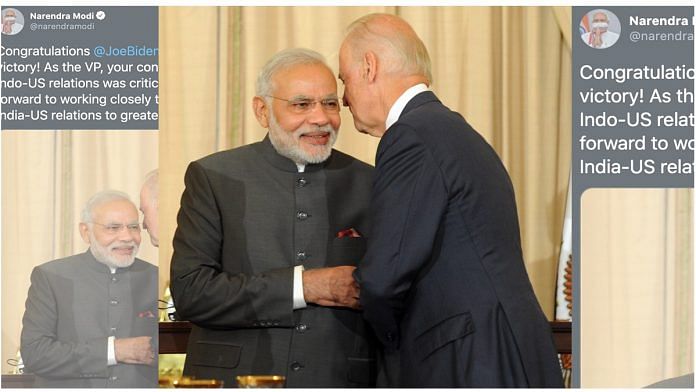New Delhi: In the first week of his presidency, Joe Biden and his administration have been making phone calls to key US allies including the Quad members, Japan, Australia and India, signalling continuity with change, especially in the Middle East.
In episode 671 of Cut the Clutter, Editor-in Chief Shekhar Gupta explained what this means for the US policy in the Indo-Pacific, the Middle East, and its impact on India.
Gupta noted that there is a hierarchy in calls — first Biden called treaty-bound allies like Britain, Australia, New Zealand and Japan. The next country to be called by top US officials was India. Similar calls took place between the US and other countries as well, like Russia. “While the basic American strategic direction remains the same, big changes are going to take place in many areas,” noted Gupta.
Japan, for instance, is a treaty-bound ally of the US and is under pressure from China due to territorial disputes over the Senkaku Islands. Over a phone call with Japan Prime Minister Yoshihide Suga, Biden said that the US particularly remains committed to Article 5 of the US-Japan security treaty, which lays down the direction in case one of the countries is threatened by a third country. Biden has also confirmed extended deterrence of the US nuclear umbrella for Japan, and the protection of Senkaku Islands, which is a message to China, Gupta pointed out.
In its calls to India, not only was the US-India Alliance reaffirmed, but much was also said, by all the top American officials and also by Joe Biden, which removes any doubt that the new administration will not be committed to the Indo-Pacific construct, said Gupta.
In a phone call with his Australian counterpart Marise Payne, US Secretary of State Antony Blinken stated his commitment to the Quad — which the Chinese government had called an ‘instrument of new Cold War’. In its phone calls to the Philippines, Malaysia, Vietnam, the US has reasserted that it remains committed to its territorial status in South China Sea and rejects Chinese claims over 80 per cent of the South China Sea – this is very important to the Philippines, which is also an old ally of the US.
Changes in the Middle-East
In the Middle-East, the Biden administration has halted the supply of precision-guided munitions to Saudi Arabia, because of the concern that the Saudis are using them in their bombing missions over Yemen. The Biden administration is committed to withdrawing support to Saudi missions in Yemen, however, it remains committed to protecting Saudi Arabia from attacks — “…chances are that the supply may resume after some ground rules are laid,” Gupta explained.
Similarly, a bigger issue has arisen with the UAE. As part of the Abraham Accords, UAE was to buy 50 F-35 stealth fighters and 18 Reaper drones from the US. But the Biden administration has stopped this for review.
Most of the Middle East countries see a threat from Iran which is the most stable, civilisational nation in the Middle East. Unlike Iraq, Iran is not a country where any superpower can dream of an enforced regime change. So Iran is a country with which the Biden administration is actually committed to resuming negotiations, and hopes to bring back JCPOA – a Joint Plan of Action to limit Iran’s nuclearization.
It is important for Biden to give a signal to Saudis, UAE, and other Middle-East countries: During the Trump administration, these countries were able to influence or manipulate Trump’s policy on the Middle East to their benefit by demonizing Iran even more.
Biden is creating space for himself to be able to make progress with Iran. “And that is also a message to Israel — that America is not an ally with you against a common enemy or against some new evil empire, that is Iran”, Gupta said.
India also stands to benefit if sanctions on Iran and Venezuela are lifted as it may ease up India’s oil import situation, he said.
Also read: These are the Obama-era lessons Joe Biden can learn from




Biden’s Vice President will chop Modi’s head off for his human rights violations in India and Jammu and Kashmir.
??? Lol really ?? What are you smoking ??